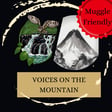Become a Creator today!Start creating today - Share your story with the world!
Start for free
00:00:00
00:00:01

Digestion Points Part II
A point by any other name... The second part of our episode discussing the insight that point names provide to understanding how to use the points clinically. The ancients wrapped enormous understanding, experience and clinical guidance into the names of every point, and all we have to do is decipher them in the context in which they were given. Based on Nei Jing concepts and excerpts, we delve into key digestive points. We discuss the Great Luo ot the Stomach called 虚里 xū lǐ, and how that provides great insight into points like ST36 足三里 zú sān lǐ, ST37 上巨虚 shàng jù xū, etc.
Transcript
Functions of Ren 13, 12, and 10 as Body Controllers
00:00:10
Speaker
There were a couple other names we wanted to get to. They are in Deadman, but you got to look at the description. Otherwise, they have different names. Because I think we're going to go to Ren 13, Ren 12, and Ren 10.
00:00:29
Speaker
Nice. So in, in order on the way up, Ren 10 would be the lower controller. Hmm. And then 12 would be the middle controller and 13 would be the upper controller. Nice.
Abdominal Compartments in Diagnosis
00:00:42
Speaker
Yeah. And then here I see what he's using the word controller to as a translation for the word one, which literally means like abdominal compartment. So you can see one and Lee are really the same thing. And these points literally called the lower one, the middle one and the upper one.
00:00:59
Speaker
I mean, boy, you know, there's a lot of ambiguity in what we study, but you can tell they're not trying to hide this one. They're literally like upper one problem. Use upper one point.
Symptoms of Abdominal Compartments: Nausea, Bloating, Constipation
00:01:18
Speaker
But then you just basically say, okay, well, what's an upper one, middle one, and lower one problem, respectively? Upper one, can't get the food in, right? So nausea, vomiting, upsurging, acid reflux, all that stuff, can't get the food in. Middle one problem, can't process the food. So after eating, feel full, bloated, can't do anything, can't absorb as well as you want, can't move digestively, right? Low motility through most of the tract, you betcha, middle one.
00:01:44
Speaker
And then what's the lower one? Can't poop it out. So obviously, I know people refer to it as like, I heard about a pooping diamond or something like that in the West.
Critique of Acupuncture Protocols and Individualized Diagnosis
00:01:54
Speaker
I'm not familiar with a pooping diamond. No. I don't know if it's school by school. I just go by what I hear since I come back. But they were doing Tian Shu, which I think is stomach 25, Tutsunui on either side of the navel. And then they were doing Xia Wan, Tutsun above, which is the one that we're talking about, the lower one.
00:02:12
Speaker
And I think they added GI. Yeah. I mean, maybe for young deficient people, but that's, uh, I'm sure this is going to come out sooner or later. I don't like protocols. I think they're a mindless way to do our medicine, but, um, but, you know, yeah, no, I don't think anyone likes protocols. They're only, I mean, if you're absolutely lost in the clinic and you're like, I have to put needles in this person and go rethink what I'm doing, then like,
00:02:37
Speaker
Fine. You know, like it's good to have one or two in your back pocket. You know, do stomach 36, do LI 11, do spleen six, and then go rethink about, you know, what patient and everything. That's such a good point. It's like a, it's like the acupuncture version of a long pause. Which can happen and there's no judgment on, you know, I mean, it happens to all of us, but I think to, to strive to, to not just be in protocol plan. Yes.
00:03:07
Speaker
It's good. It's hilarious too because every once in a while I'll be needling someone. I'll be like, oh yeah, they're lung cheese deficient. Their lung pulse was way down. In fact, they were almost heading towards maybe a pulseless syndrome. Definitely going to give the lung gun source point Taiyuan. But the front of their tongue was too red. But not super duper redder than everything else. They just needed to send some. So why don't I go ahead and give Nei Guan PC6, I believe. But at the same time, even though the front of their tongue was red, weirdly, their heart pulse was
Intuition vs. Map: Navigating Diagnosis
00:03:34
Speaker
down.
00:03:34
Speaker
So let's go ahead and tonify the heart, shun mud. And then I looked down and I'm like, oh shit, is that Buddha's triangle? Yeah, Buddha's triangle, my dude. But the thing is, it's like the protocol didn't get you there. The symptoms and pulses and signs got you there. Then use whatever you want, you know, because you're doing it the right way. Right. But that's obviously when the protocol would have been perfect if you, but, you know, again, why use a protocol? No, I think about it as, um,
00:04:00
Speaker
being lost in the woods and being able to get your way out based off of a compass or just understanding where you are and the natural environment around you, or being like reading a map and being like, oh, I can go to here or there. But if you don't know where you are on the map, it does you no good. If you don't know where you want to go on the map, it does you no good. So it's really like you need to have those bits down. And that's where I think the
00:04:27
Speaker
The more, it's not just intuitive, but it's like an ingrained knowledge wheel that is turning out ideas. I love it. I love it. And you're right. I know as practitioners, we should be, we should be compassionate to ourselves too, right? First time you see something in the clinic, of course you're not going to know. So yeah, maybe slap in a protocol and figure, figure something out, you know?
00:04:49
Speaker
But yeah, you're absolutely right. So the compass, I could see that as being a good base if you just totally lost, but then the goal is to build up to the map. That was a nice metaphor. Sure. Thanks. I think I stole it, like all these things.
Fortifying the Interior: Translation and Understanding
00:05:03
Speaker
The description of the upper, middle, and lower controller actually brought some light, too, on the one that we skip over in this idea. Rent 11, strengthen the interior. I don't know if that's a good translation or not. Fortify the interior.
00:05:16
Speaker
Yeah, but that one's indicated for, and here we go, indications, right? And how are they useful? That one's indicated for food stagnation. And on your little description, right, of they can't take the food in, they can't process the food, they can't poop it out, right? And between the processing and pooping out, there's one for the problem that you're going to have, which is food stagnation. That's right. That's right.
00:05:40
Speaker
Yeah, and you're exactly right. So it's like the part of that middle burner processing, especially the absorptive half. And that word jin li, so for those of you out there, the word for strengthen, which we would really translate as fortify a spleen, is jin pi. And we don't use the word bu to tonify. We actually use a separate word. That's why fortify is a perfect translation. It literally means to build up like a mound of earth or a wall of earth, jin.
00:06:09
Speaker
or building even if you were going to build that high. So anyway, jin li means to fortify the interior. Wonderful point for strengthening absorption.
00:06:19
Speaker
And that's a funny one too because one of the ways I tell people to learn how to use these is diagnostically for those questions.
Palpation Techniques for Middle Burner Diagnosis
00:06:27
Speaker
So you see how they're absorbing, taking in, expelling out food. The second one is palpating. And I know Ash is a big fan of this. Love to palpate that line. And if you feel any big nodules or blockages right at Shang Wan, Jung Wan, or Xiao Wan, that's a pretty solid go.
00:06:42
Speaker
But interestingly, at Jinyi, the three-tone above point, I often look for a big empty cave, like a total deficient hole, and then you know some deficiency in there too.
00:06:55
Speaker
Totally. I feel like when I palpate, I palpate for interesting things. That's what my brain looks for, which is basically different than the pattern, right? Like, Oh, they're all, everything's kind of slack on them. Okay. So then like, what's really extra slack or like, where's that little tension held? It's just little differences or actually looking for the biggest differences. And then I just.
00:07:16
Speaker
go after that because keep it simple. Don't overthink things, especially when I'm in the clinic room. The last thing is that
00:07:27
Speaker
Do you ever then go horizontally with the palpation? So it's like you hit a tender point or you hit that deficient point at REN11, do you then go out to, it's going to be stomach 22, but the same line on the stomach channel, kind of figure out what's going on that entire level.
Horizontal and Vertical Palpation Methods
00:07:42
Speaker
That's a great idea, man. Yeah, I do. I focus, I think, as probably I would guess most people do a little bit more at the navel line when I'm going horizontal, because that stomach and then the forts went out, spleen point are just such a rocking
00:07:55
Speaker
cool combo or individually used. But yeah, so I'll definitely go horizontally too. But I would say more focus on vertical and less focus on horizontal. But I love it as far as getting more information around any sort of blockage or nodule. You betcha. Sweet.
00:08:15
Speaker
Sweet. All right, so we got three wan points, but you guys remember, wan is synonymous to li.
Ju Shu Points and Bi-directional Treatment
00:08:22
Speaker
We got the hand and foot, three li. We got the hand and foot, five li. But then we got two more. We have two more. Well, we didn't really talk about shang ju shu and sha ju shu, right? Oh, yeah, sure. The upper and lower blood. Fecuity? No. Yeah. Void. Is that how they translate it?
00:08:43
Speaker
See, they're translating shoe as void. Yeah, it's like, yeah, upper, upper, bigger void and then the lower void. That's right. Upper, bigger void and lower or upper gigantic void and lower gigantic void. But the big problem is void is wrong. Now, you know, aha, shoe, the shoe is the reference is the first name in the stomach great law. So this is also the upper gigantic
00:09:10
Speaker
stomach point and the lower gigantic stomach point. Zhu is like giant or great, so it's large in comparison. But the key here is sha, sha hei shu, which is like the lower hei points. Same pattern. Think about an upper hei point versus a lower hei point. So obviously it's just the upper, it's just the three hand yang channels that have lower hei points. But when would you use the large intestine hei versus the lower hei of the large intestine?
00:09:40
Speaker
As my understanding was, you'd use the lower one when you're trying to deal with an organ problem, and you'd use the upper one when you're doing channel stuff. Oh, so good. More external, more channel, and just like Asher said, channels are more exterior than their organs. That's exactly right. So a good example is large Intesto 11, right? Is that true, sure? Yeah.
00:10:01
Speaker
So large intestinal 11, what's one of the best ways times to know when to use that? Red dots on the front of the tongue, right? Why red dots? First of all, it's got to be on the front of the tongue because we're dealing with upper heat, right? So wind heat, kind of flicking the upper burner, that sort of thing. But why specifically red dots?
00:10:22
Speaker
Toxic. Toxic. And what do we do? And here's the reason I tell people this so much is it's so important to understand toxic heat because you don't clear first. You know what you do first. Move. You move. And then the chu-si point is for rectifying the flow of a channel. Hence, you can clear and disperse its stagnation while clearing its heat. So when people use chu-si as a full body heat point, I have to disagree. But if they use it for an external or stagnated toxic heat point,
00:10:52
Speaker
I just applaud. I don't speak. I just applaud. Oh, so anyway, so Ash was having a hundred percent, right? So Shang-Ju Shu, just absolutely incredible for large intestine dysfunction. Interestingly, if you go to the indications for that, it's kind of confusing because it's good for diarrhea and for constipation, but it's just because it regulates the large intestine, right? So it strengthens the large intestine's function, thereby it's kind of bidirectional.
00:11:19
Speaker
Points can be bi-directional and herbs just rarely can ever be, basically never.
Needle Techniques and Treatment Impact
00:11:25
Speaker
Yeah. Well, we should get into the point, uh, tonification and sedation techniques. Oh yeah. All the directions that you can needle a point in and whether or not that's actually having an effect over things. I do say, I do think I'll just say,
00:11:44
Speaker
there's probably a master out there, more than one who the last 10, 15% of what they do is in a very specific needle technique, but I think for the vast majority of us, it's just getting the chi at the right point. That's right.
00:12:01
Speaker
and how well you can get duchy and what kinds of duchy you can get. So once you get duchy, it's fascinating, too. I think you were talking about this before, actually, where you get different sensations. It's not always lightning bolt duchy. Sometimes it's tingly duchy or lighter, ephemeral duchy kind of feelings.
00:12:19
Speaker
Yeah, or that heavy ache and what that tells you about the prognosis and what's going on in the body. And yeah, yeah, I think you you taught me that if it's shooting with that one's always kind of like a pretty high treatment. Yeah, efficacy. Yeah, because you literally are feeling the movement of chi in the body.
00:12:40
Speaker
You bet,
Needle Sensations and Treatment Efficacy
00:12:41
Speaker
you bet. And then, and then if they have like a distal, like warming or something, I'll be like, Oh, that's cheap moving into an area. If it's cooling, I'm usually like, Oh, that's probably cheap leaving that area. That's stagnant. You know, you're going to feel the heat leave, which is going to make you feel colder. You're going to feel the heat arrive. We're just going to make it feel warm. Love it. Heck yeah, man. Heck yeah. I always go back to Dr. Guo whenever we talked about needle sensation, because boy, he opened my mind. Like I'd already been studying in China for,
00:13:10
Speaker
I'd already been there for six or seven years. And then four years before I left, I got to meet Dr. Guo, totally incredible. It just blew my mind. I literally did not, I felt like I was a beginner again back from step one, like acupuncture. I was like, oh my God, there's so much here to learn. But it was funny, the first time he needles me and some of the other students, we'd been studying with him for months by that point.
00:13:36
Speaker
He came to Beijing regularly. Every six weeks, he'd come from the neighboring province, which was Shanxi. So he'd come in and then we'd study with him for the four to six days that he was there. And he was in the clinic multiple times, really hard working, even in his 80s and everything.
00:13:56
Speaker
Anyway, so one time we were like, wait, we've never felt his needles. So we see what he's doing. We see the insane efficacy, but we've never felt it. And so we, there was three of us there and we're like, Hey, um, doctor, what would you mind needling us so we can feel it? And he's like, sure. He was sitting down and he just puts in, uh, this small intestine three, right? Hoshi. Yeah. So he just drops in Hoshi at all of us, which is a pretty tender point, but his needling technique is very different. It's, um, and every one of us were like, Oh, okay.
00:14:26
Speaker
Like that is, it's not painful. It's just like lights your arm up. And his was like a nice traveling one that got right around towards our elbow. And we're like, yeah, okay, we definitely see what you're talking about. But this is the part that really blew our mind. He was like sitting there just drinking his hot water like he likes to do. And he's like, yeah, but obviously speaking Chinese, he was like, yeah,
Anecdote: Skilled Needle Technique Experience
00:14:47
Speaker
but if I opened my hand, the one that he'd needled us with, he's like, I opened my hand, then it continues moving up your body.
00:14:53
Speaker
No joke, he opened his hand and it went to our shoulder. Every one of us were like, all right, that just confused every part of my brain. You literally just broke my brain. Because when you go to China, by the way, for those of you who are going to head there for longer or shorter period of time, you'll hear a lot of big talkers and very few big doers.
00:15:13
Speaker
And I never heard him brag about anything that he could not just sit down on the table. Um, and it was just incredible. I mean, it's not bragging at that point. It's just literally telling you he's got mad skills, right? Yeah, notification bitches. Oh, sorry. No, it's a good, it's a, it was a good bitches. I feel like whenever I hear people brag a lot, especially when they're doing it themselves, it's different if other people are like talking well about you.
00:15:40
Speaker
But if you're an armistice and you're talking about like, Oh, I'm, I'm the shit on the B's knees. Uh, there's a Dow quote that comes to mind where it's, you know, the Dow flows to the left, to the right. And at the end of it, it goes, you know, where, where successes are made, right? You make no claim to them that, you know, cause it's the Dow flowing through you and not so much you doing it. It's the universe that is doing this amazing thing. And you're just like
Humility and Learning in Practice
00:16:05
Speaker
long for the ride. I love that. And you get in the way where you're letting it go. Right. Right.
00:16:10
Speaker
Absolutely. Yeah. I don't know if this was helpful, but I gave the graduation speech a couple of years in a row at the Boulder School here. Oh, nice. And both of them. One part of the element was summarizing. And I think I probably said it in a more gentle way, but I was like, guys, you do realize that
00:16:36
Speaker
This is a wonderful accomplishment. Congratulations to all of you, but it's actually not about you. By the worst graduation speech. After graduation. I know, right? But I also tell them, there's a reason why it's not about us because everything that we know and do well came from before. It's all of the stuff that's
00:16:59
Speaker
So there's this interesting thing, the best way that Chinese medicine and just in general Chinese culture gets away from the pride thing, where I think is really kind of dangerous, the one that Ash was talking about, is it's not about us. It's about our lineage, right? We practice great things. We're not great. There was a famous Tai Chi master, Dr. Chenmen Ching, who's a doctor as well, but Professor Chenmen Ching, and they said that too. They're like, how come you're so great at Tai Chi? And he's like, I'm not great.
00:17:26
Speaker
was like a sickly kid. Every time I stopped practicing Tai Chi, I couldn't breathe. And I just keep practicing a great art. The art is great. It's not me. Well, that's the same thing. When we fix a jaundice patient, heck yeah, it feels good, but it's not about us. It's about correctly applying the classic understanding and knowledge.
00:17:46
Speaker
that's a really liberating thing too. When people get stuck and they think it's all about them, it's all their failure. But when people get stuck and they know it's their lineages behind them, they always go back to the classics and they have so many resources to drop on. So I was trying to say it and hopefully I said it in a more uplifting way at the graduation speech. Yeah. Yeah. No, I think the points were taken. I also think that
00:18:12
Speaker
You know, that's just the first one when graduating.
Graduates' Journey: Advice and Metaphor of Surfing
00:18:16
Speaker
It's an accomplishment, don't get me wrong. But then, I mean, if you're running your own business, that's its own thing. Having good work with your patients, that's another one. And there's like your self growth thing on the side over there. I mean, there's a lot of pieces to the whole thing. And yeah. Hey, Kevin, it is hard to juggle all that together. But I think the point, I like the point about
00:18:40
Speaker
it being, we're a part of this great river that's flowing and has this amazing power. I think out here, you can compare it to a surfer. It's like the wave was great. I was able to surf it, but it was the wave that makes the ride rather than the rider. Love that, dude. I got to get out there. All your metaphors are awesome. Running in volcanoes, surfing on waves, just rubbing it in, man.
00:19:09
Speaker
Sweet. Well, hopefully you guys liked those point names. We're going to actually be doing a number of them. These ones were just the ones really focused on digestion. Yeah. We'll catch you next week for me and Steven. Yeah. See you guys from the mountain. See you on the mountain.





